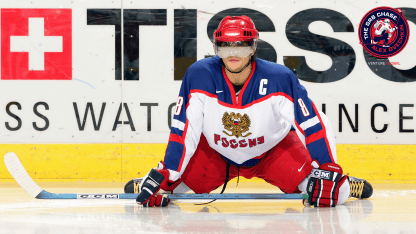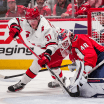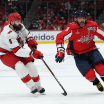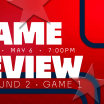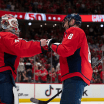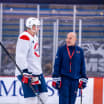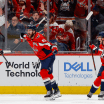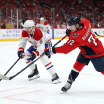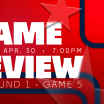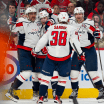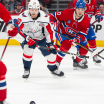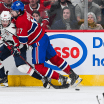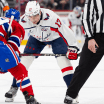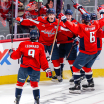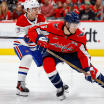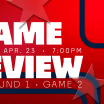As we count down these last eight games of the 2024-25 regular season – the 50th season of Capitals hockey – and as the Alex Ovechkin chase of Wayne Gretzky’s goal mark reaches peak velocity, we’re going to share a personal memory of these last 20 years with the Gr8 Eight every game day until season’s end.
Today, we take you to Ralph Engelstad Arena in Grand Forks, ND for the 2005 IIHF World Junior Championship, the only WJC I’ve ever attended, and the first time I witnessed Ovechkin – who was 19 at the time – playing hockey.
Soon after the Caps drafted Alexander Ovechkin with the first overall pick in the 2004 NHL Entry Draft, the NHL went dark. Following the conclusion of the 2004 World Cup of Hockey, the League’s owners initiated a lockout that killed the entire 2004-05 season, the first time a major North American pro sports league lost an entire season to a labor dispute.
The labor woes weren’t solved until late July of 2005, when the 30 teams scrambled to get to a makeshift NHL Draft in Ottawa and to start signing free agents and stocking their rosters for the upcoming 2005-06 season.
Ovechkin was under contract to Moscow Dynamo that 2004-05 season, and he told us on draft day – and has reiterated every time I’ve heard him speak about it since – that he always intended on honoring the last season of that contract in Moscow, and that even if there had been a 2004-05 season, he would not have played for the Caps until the following season.
Quite fortuitously, the 2005 IIHF World Junior Championship was held in Grand Forks, ND and Thief River Falls, Minn. With Ovechkin and some other young Caps hopefuls of the day – including Team USA’s Chris Bourque – participating in the tournament, I developed a plan to travel to the tournament simply to see Ovechkin play for the first time. I managed to get credentialed, and an even greater feat was getting one of the last hotel (motel, if we’re being honest) rooms in town, at the Check Inn (I kid you not).
On New Year’s Eve of 2004, I flew from Baltimore to Minneapolis, then hopped a short flight to Grand Forks International Airport. When I landed in Grand Forks around dinner time, the winds were howling, there was about a foot of snow on the ground, a fresh batch of freezing rain had fallen, and the temperature was 7 degrees Fahrenheit.
That would be as “warm” as it would get during my five-day stay.
There was some serious star power at the 2005 WJC. Unsurprisingly, Team Canada won the gold; its roster featured Sidney Crosby, Shea Weber, Dion Phaneuf, Jeff Carter, Ryan Getzlaf, Corey Perry, Patrice Bergeron and captain Mike Richards.
Team Russia fell to Canada in the gold medal game with the likes of Ovechkin, Evgeni Malkin, Alexander Radulov and Anton Khudobin while Team USA boasted Ryan Callahan, Ryan Suter and Alex Goligoski, but its standout player was 17-year-old Phil Kessel, the youngest player on the roster of any of the quarter finalists.
My first look at Ovechkin came on Jan. 2, 2005, in a semifinal game against Team USA. The Russians got an early jump on the Americans – with Ovechkin scoring on the power play to make it a 2-0 game. Team USA rallied to even the score, but Russia scored five unanswered – the last two into an empty net – to win 7-2. Penalties undid Team USA; Russia had a dozen power plays in that game to four for the Americans.
After the game, I asked Team USA goalie Al Montoya if there was any similarity between Ovechkin’s shot and Malkin’s.
“No, not at all,” said Montoya. “Not Ovechkin’s shot compared to Malkin’s. Ovechkin gets the puck away without you even knowing it. That’s why he is such a great player. Malkin is more of a shifty player. You had to keep your eye on him when he was coming down the ice because you never knew what he was going to do, pass it or shoot it.”
After games, reporters line up in a common area to speak with players and Ovechkin patiently (if obliquely) answers all queries until the last tape recorder has been switched off. Here’s how that went. (I have no recollection of who asked which questions.)
Your visor, what kind of visor is that?
“It’s special,” he grins.
It makes you look like a race car driver.
“Race car? No. I’m just a hockey player. No race cars.”
Can you compare yourself with Sidney Crosby?
“I’ve never seen him. I know he is a good player, and I will see him.”
Do you look forward to the chance to play this game, best player against best player?
“When we play Canada, we don’t play Crosby, we play Canada. It’s not one player. Hockey is a team game.”
How much better are you this year than you were in Halifax (two years ago, Team Russia downed Team Canada for the gold medal at the WJC tournament which was held in Halifax that year)?
“I feel more comfortable. I think I play a better physical game. I play for the team.”
How does this year’s team compare to last year’s team in Helsinki (the WJC was played in Helsinki last year)?
“I don’t want to remember last year. It was a terrible season for Team Russia. We finished fifth. We have a good chance to win this championship.”
My turn now. Having watched Ovechkin play just one game, one thing stood out to me. He gravitated to the high slot, whether his team was on the power play or at even strength. He circled around a bit in the offensive zone, like a shark looking for blood. But he inevitably drifted out to the high slot where he lurked in wait for a pass.
On the first Team Russia goal in the semifinal game against Team USA, he fanned on a pass from that spot only to see the puck go across to the far wall where defenseman Dmitri Vorobiev blasted a one-timer home to put the Russians up, 1-0.
Not even three minutes later Ovechkin was in the same location when a similar pass came to him. He didn’t miss that one, and in fact, it wasn’t on his stick long enough for him to realize that he even had it. He lashed a one-time wrist shot into the top corner of the net.
Later in the game I noticed him again gravitating to the high slot. Sometimes he’d shoot, sometimes he’d allow the puck to go through his legs to a waiting teammate, and sometimes he’d serve as a conduit, deftly redirecting the disc to a teammate in one direction or another. He has the ability to move pucks in any direction and his thick wrists give him excellent control of where its heading and with how much velocity; he can really rip it, but he’s also able to finesse a feed to a teammate – and with remarkable accuracy -- just by slightly changing the angle of his stick blade.
Gretzky had his office behind the net. Adam Oates loved to dish from the half-wall. It’s just one game, but Ovechkin seems magnetized to the high slot.
After the game, I ask him about it.
“You seem to like to camp out in the high slot area,” I note. “Is that something you’ve always done or is it something you’ve started to do recently?”
“Uh, you know, it’s a secret,” he grinned impishly, after a short pause.
“Coach knows I have a good shot,” he continued, “a good one-timer shot and that’s why I stay in this position. If they get me a pass, I might just shoot.”
Consider it a forerunner to the left dot office he has established here in the District these last two decades.
A couple nights later, Canada crushed Russia 6-1 in the Gold Medal game, a game in which Ovechkin departed with a shoulder injury in the second period, the result of three Canadians bodychecking him at once. I remember being impressed by him sitting on the bench with his teammates after suffering the injury; he wanted to be with them instead of getting treatment, even in a hostile environment with his team on the wrong end of a lopsided score.
I also admired his diligence – he was the last guy off the ice after warm-ups and he finished his checks – and his leadership. He took charge during warm-ups and could be seen directing traffic during the game, as well as lobbying the officials; he was captaining the Russian squad. I also saw it after the game, when he consoled a sobbing Malkin after Canada’s victory.
And Ovechkin’s joie de vivre was palpable; you saw it in his interactions with teammates, and it manifested itself in his answers to the media’s questions, and the unbridled glee he displayed when he or one of his teammates scored, even in those days before his NHL career began.
Years later, former Caps defenseman Steve Eminger – now a pro scout with the New York Rangers – shared some fascinating insight on what it was like playing against an even younger version of Ovechkin.
Eminger skated for Team Canada at the 2002 WJC Tournament in Halifax, where he played against a 16-year-old Ovechkin.
“I actually played against him in the World Juniors in Halifax,” Eminger recalled. “I played against him because he was on the offside and I was a right [defenseman]. I knew some of the hype about him, but I didn’t see him at all until then. He was an ’85 [birthdate] so he was underaged at that tournament, and he was just so dangerous. Trying to defend him 1-on-1, not so much beating you, but shooting through you.
“I had played [half a season] in the NHL, and I had never seen that, had never experienced someone who was able to shoot through you that easy. He would go through your legs; he would just cut to the inside a little bit and take a shot. His shot was unbelievable. That’s what I remember about that tournament and first facing him.”
About nine months later, Eminger and Ovechkin would be teammates and the fans in DC would finally see exactly what Eminger found so difficult to defend, and so much more.

